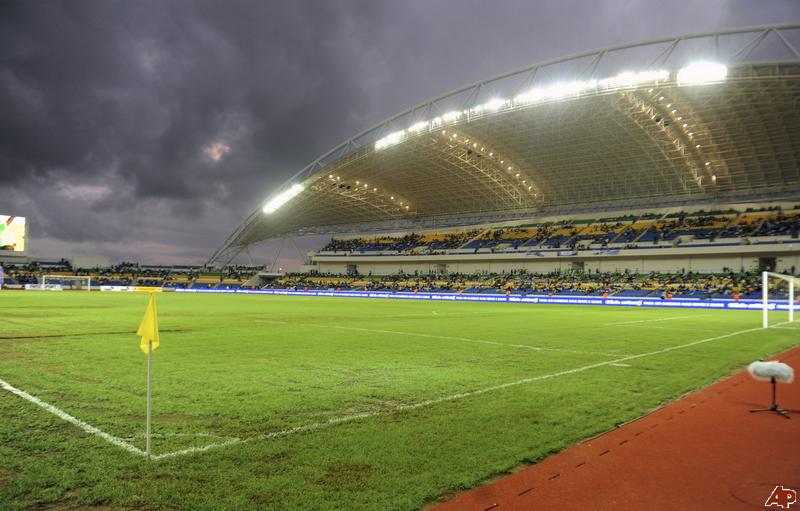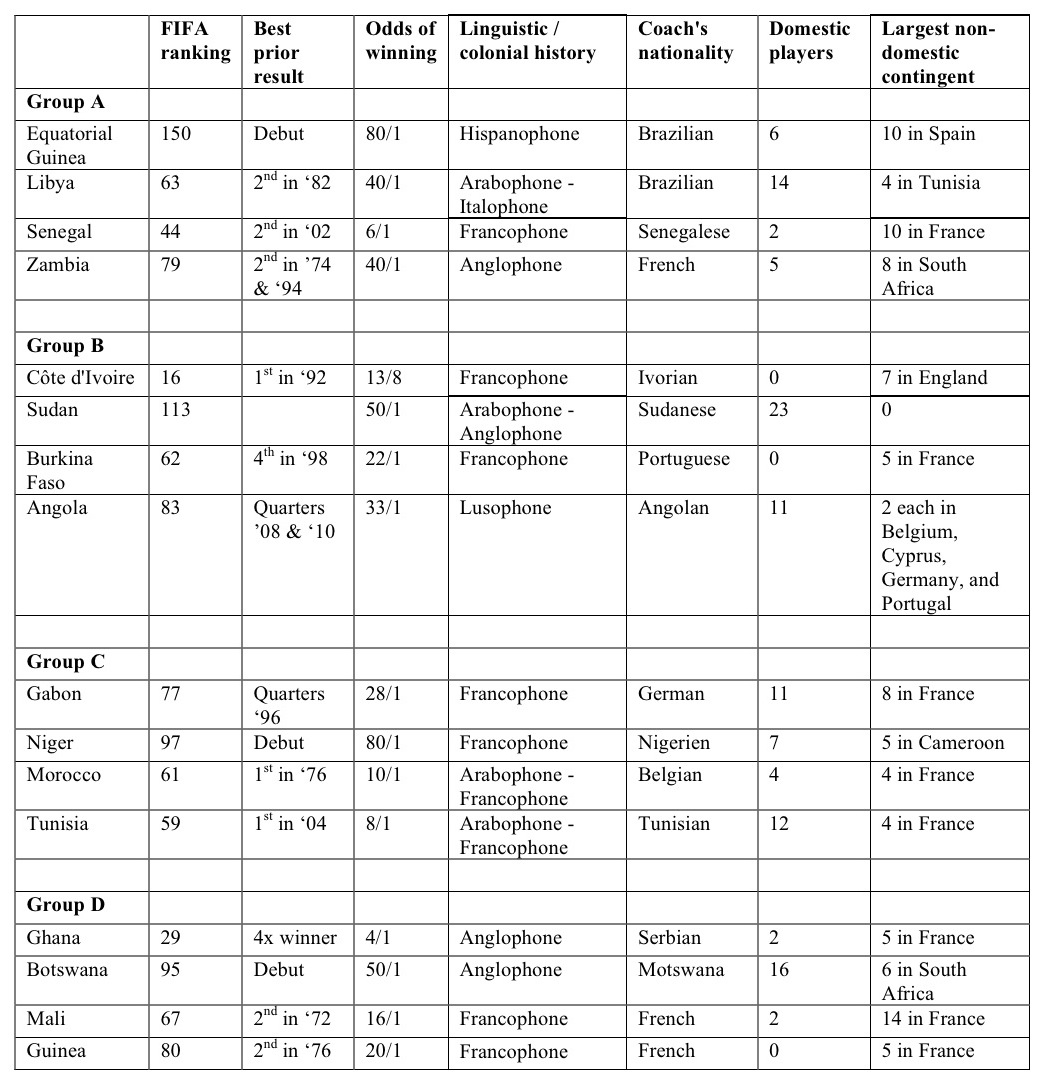
Guest Post by Andrew Guest (drewguest AT hotmail DOT com)
It’s that time again; the biennial opportunity for Africa’s best national teams to compete for the continental championship, and European club management to complain about the audacity of former colonies holding a tournament smack in the middle of the league season — extracting labor in a reverse flow that might promote some useful self-reflection, if not for the blinders fused on most of the professional football world.
It always good fun to watch the machinations, even from a distance — the actual football starts January 21 in Bata, Equatorial Guinea, and ends with the final on February 12 in Libreville, the capital of co-host Gabon. As in 2010 in Angola, most of us will be watching from a distance: the oil-rich states that CAF has recently favored in its hosting decisions are note easy places to get to.
According to trusty web travel agent “cheaptickets.com,” if I wanted to get from my current sabbatical home in Michigan, USA, to Equatorial Guinea in time for the first round my “lowest fare” would be a cool $2506.00; getting to Libreville Gabon, on the other hand, would only set me back $1517—of course then I’d have to work on the visa, the accommodations, and the game tickets . . .
So, as might by now be obvious, I tend to think of the tournament as much as a chance to polish my armchair socio-historical geography as it is a chance to enjoy some good football. A few years ago, when I was regularly writing for the web-site Pitch Invasion, the armchair hobby led me to speculate on a slight but significant “Francophone advantage” thanks to the complicated interactions of football talent flows, colonial history, and post-colonial immigration patterns. Of course, the fact that Egypt and its contingent of mostly domestically-based players and coaches have made a habit of claiming the Cup of Nations for its own (having won the last three in a row) doesn’t help my hypothesis.
But this time Egypt failed to qualify, Anglophone power Nigeria won’t be there, and the socio-historical power dynamics might once again find some space on the pitch. My somewhat miscellaneous tabular preview is below — this time without much commentary, leaving most of the hypothesizing to you (for now). I would just observe quickly that the French influence this year seems ubiquitous; 9 of 16 teams have Francophone history, the largest delegation of foreign coaches are French (4, compared to 7 locals—which is a fairly significant local contingent compared to recent tournaments), and 8 of 15 squads draw more players from French professional teams than from any other foreign league system (the 16th squad — Sudan — has an entirely domestic roster). Whether that proves an advantage or not, we’ll soon see.

Categories
8 replies on “An Armchair Geography (and Preview?) of the 2012 Africa Cup of Nations”
This is an intriguing overview and suggests that we still need to know far more about the impact and legacies of French culture and sport in the former French colonial regions of Africa. On another note, it is interesting to see that Egypt and Cameroon as well as Nigeria are absent as is recent World Cup host and host nation to many players from other African countries, South Africa. This surely indicates that football in Africa is improving and that formerly successful teams cannot rest on their laurels. Imagine a Euro championship without any of Germany, Italy or Spain qualifying. As for travel, try the quote from my current short-term teaching home of Barbados to Equatorial Guinea!, Even though there are no land masses between the two countries one has to fly to the Global North and back down again to get there from here.
[…] Andrew Guest previews the 2012 African Cup of Nations for Football is Coming Home. The post comes complete with a table illustrating these findings. The image above is of Moussa Sow, Lille and […]
Thank you Andrew for the thought-provoking post and for the wonderful table. So useful for those of us who chew football. The French Connection in African football is further reflected in the commercial and media arrangements. For instance, the title sponsor of the Nations Cup is Orange (France Telecom — http://www.orange.com/en_EN/). The media rights are contracted to SportFive (http://en.wikipedia.org/wiki/Sportfive).
I am supporting Botswana in this Cup because I visited there recently, 2/3 of their players based at home, they’re coached by a local, and few give the side any chance of making it to the second round. It will also be interesting to see how Morocco does after some disappointing results in recent years. No easy matches on paper, that’s for sure.
Thanks for the comments John and Peter; partially in support of the non-francophone underdog, and partially to support the Chinyanja speakers of the world, I’m for Zambia. But I also think that getting Gabon as one of the hosts at 28 to 1 is not bad for an outsider (I got the odds, by the way, from Ladbrokes.com on Sunday–so they might be changing).
One other thing I somehow left out of the table: Sudan’s best finish was when they won (at home) in 1970.
Also, if anyone is curious, I stumbled across another blog post today that goes into more numerical detail about where the players ply their trade: http://www.thebesteleven.com/2012/01/2012-africa-cup-of-nations-nations-of.html
Interesting…but explainable by 2 things
-the french colonial empire was mainly in Africa (unlike UK: India), therefore there was a lot of migration and many dual citizens (11 of the 23 sengalese players were born in France and do not speak wolof or pulaar or any other local language)
-the French clubs are poorer than the premier league: they source talents in Africa (Academie Jean-Marc Guillou where Yaya Toure, Zokora etc.. come from; now Institut Diambar in Senegal).
Go Senegal!
[…] Read the post in full here. […]
http://www.mirrorfootball.co.uk/opinion/blogs/mirror-football-blog/Africa-Cup-of-Nations-preview-The-starts-to-watch-out-for-from-Ghana-Ivory-Coast-Senegal-Morocco-and-more-article855405.html
Thanks for your analysis. It is interesting to see that many African teams rely heavily on foreign coaches and foreign based players. How much does this influence affect natural African tendencies or qualities? Will an African team ever win a World Cup? Can you ever become better than a German when your training is based on a foreign model for instance? I think time will tell.